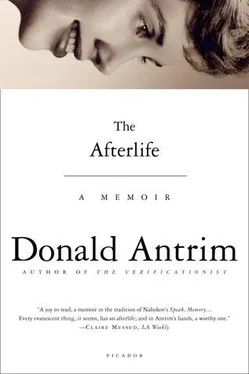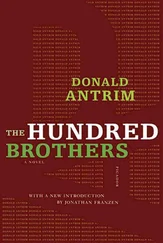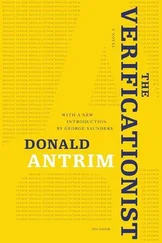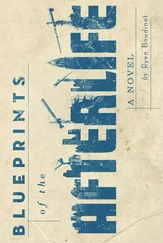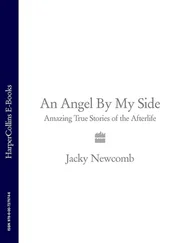After hearing that, I had a conversation with her pulmonary specialist, who told me that my mother would not recover, and that invasive or aggressive therapies were out of the question. Radiation might give her ten months to a year. If the malignancy were left to grow unchecked, infections brought about through the blockage of one lung would kill her in half that time.
“Your mother has made it clear that she intends to refuse the radiation,” he told me.
We talked a while longer. He asked me about my own smoking, and I admitted to some; he suggested that it would be better not to do it, and I agreed. I thanked him and hung up the phone, then made my way out of the living room and down the hall, passing the dimly lit bathroom and the little extra room that, before too long, would be packed and spilling over with uncrated marble-top bureaus, rolled and folded-over rugs, and carefully wrapped and boxed smaller items saved from my grandparents’ house out on McCoy Cove Road, and, from my mother’s house, old artworks and an Art Nouveau lamp and a stained-glass vase and an ivory brooch — all the various belongings that I could not part with, yet which I fear I will never learn to live with. I made my way down the hall, as I was saying, to the bedroom, where R., my girlfriend at that time, waited under the sheets. I got in bed beside her, and, after I’d cried a long time, she and I made love, and, at some point in the day, I got out of bed and phoned the airlines and packed a suitcase, and, early the next morning, I was off.
My first stop was the Charlotte airport. I called my father in Miami from a pay phone in the commuter-flight terminal. I told him how things were, and he told me how sorry he was, and then we were silent. I remember waiting for him to say something more. Or was my father waiting for me? He and my mother had, after all, been high school sweethearts. Not long ago, while sorting through a box of family photographs, I found a picture cut from a Sarasota newspaper.
“Panhellenic members lived it up this week, when they had a holiday dance at Tropicana,” the caption begins. My future parents, home on vacation from college, sit across a table from another couple. It’s the mid-fifties, and my mother has on black evening gloves; her hands rest on a table draped with a plain white tablecloth. She wears a sleeveless, backless white dress fastened at the throat with a choker made from darker fabric — it appears in the picture, though it is impossible to tell, for sure, that the choker closes with a brooch. Her hair is pulled out of the way in a hairdo that is difficult to see in detail. She wears costume pearl earrings of a sort that I remember her putting on for parties when I was a boy. Smiling, she gazes down and away from her future husband, who, sitting beside her — from the camera’s point of view, my father is more or less behind her — and wearing a dark jacket, a narrow, tightly knotted tie, and a white pocket square, leans in close with one elbow propped on the table. His open hand rests near her bare arm. But he does not appear to be touching her. Instead, he is staring at her face in profile. Frankly, uninhibitedly, he appraises her. And my mother-to-be, aware of his eyes on her, aware of being seen by him (and by the camera) — is an alluringly beautiful, coy young woman. Unless I am mistaken, she is in love.
That day on the telephone in the Charlotte airport, I listened as my father described Hurricane Floyd, at that moment racing toward Miami. Floyd was expected to make landfall with greater force than 1992’s Andrew, which had ripped apart entire districts of the city. My father was preparing his house for Floyd. He and his wife had, at that time, two old, sick cats. My father doted on the cats. He told me that he and my stepmother planned to wait out the storm with their pets in a barricaded bedroom closet.
“What?”
My father and his wife were professors at a Miami university. Surely the campus would offer better protection than their house. True, my father told me. Unfortunately, the shelters would not admit animals. I thought about what he was telling me, and then shouted, “Dad, if you want to use your body to shield your cats from a force-five hurricane, I can’t help you! My mother is dying! She’s dying !”
I slammed down the phone, showed my boarding pass at the gate, and marched onto the plane to Asheville. I was breathing heavily, and perspiring. My father’s love for his animals had undone me — and what had I done but angrily show my own powerlessness?
One way that I have for years maintained a relative powerlessness is by neglecting to keep a valid driver’s license. I let my Florida license, the one I’d had throughout college, expire after several years in New York, and learned to rely on public and commercial transportation, like a European. My sister would be joining me in two days; she could rent a car. During the flight, I stared from the airplane window at the Smokies below. It was a clear, hot day in September. The plane, bouncing on wind currents, was headed into the sun. After landing, all alone with the driver in an enormous van I’d hired to take me from the airport to the hospital, I watched the day’s light fading behind a western ridge of the same green mountains I’d seen from the air.
At Mission — St. Joseph’s Hospital, it took me a while to find my mother’s room. I lost my sense of direction and rode up and down in elevators. The old people I came across in the halls looked neither beautiful nor youthful. Quite a few were gasping for air in the rooms on the hall that led to my mother’s, which, thanks to her lung infection, was stickered with brightly colored quarantine notices.
I knocked lightly, opened the door, and peeked in. She was propped up in bed. “Mom?”
“Don?”
I put down my suitcase, walked across the room, leaned over, and, cautious of the tubes and hoses connecting her to pieces of equipment, hugged her.
“How’re you feeling?”
“Not great.”
“I’m sorry.”
“You don’t have to be sorry, Don. Was your trip all right? I’m glad you’re here. Thank you for coming,” she said. After that we made an effort, for a while, to talk as if nothing out of the ordinary were taking place — the way people in crises will, I suppose — and suddenly she asked, “Don, are you going to dedicate your next book to me?”
My first had been dedicated to her parents, the second to my father and his brother, my uncle Eldridge, who’d died in 1992. The third, about some misbehaving psychoanalysts in a nameless city, was scheduled to appear in early 2000.
I was trapped. Obviously, she was next in line. But I didn’t particularly want to dedicate — certainly not on demand, as it seemed to me in that moment — a book to my mother. I stood in her hospital room and said:
“Well …”
“No?”
“What I mean to say is that the new book isn’t — it isn’t appropriate for dedicating. I’ve decided not to dedicate it.” What?
“Oh. Will you dedicate one to me sometime?”
“Of course,” I promised, and, desperately, went on, “It has to be the right book. Do you know what I mean? Mom?”
“I don’t. I don’t know, Don. I’m going to die.”
“Oh, Mom.”
A nurse entered the room and tried to talk to my mother about home care. My mother thought this pointless, because she had determined on her own that the cancer had spread to her brain. She hoped to move directly from the hospital to one of the Hospice facilities known as Solace houses, meant for people in the last stages of illness. I remember that my mother’s silver-haired GP stopped by on his evening rounds, but stayed only briefly. I’d booked a night at Asheville’s most expensive hotel, far on the other side of town. I had thought that I might, in some unaffordable place far removed from the circumstances defining reality, feel — what? Protected? I told my mother that I’d see her early the next day, called a taxi (which took a long time coming), and, when I arrived at the resort, found the dining rooms closed. I trekked past empty ballrooms and conference halls, and, after several wrong turns, located my room, where I stayed awake until dawn picking at room-service food, watching television, and wishing that I could open the sealed-shut windows.
Читать дальше
